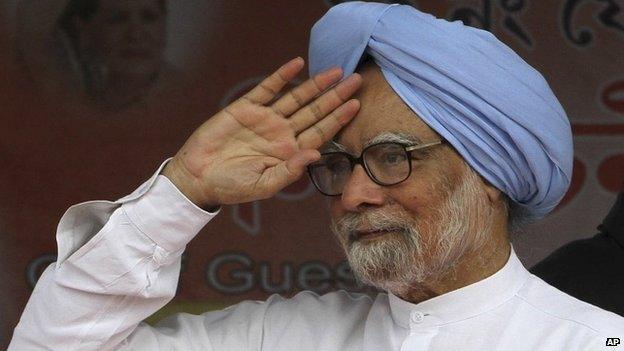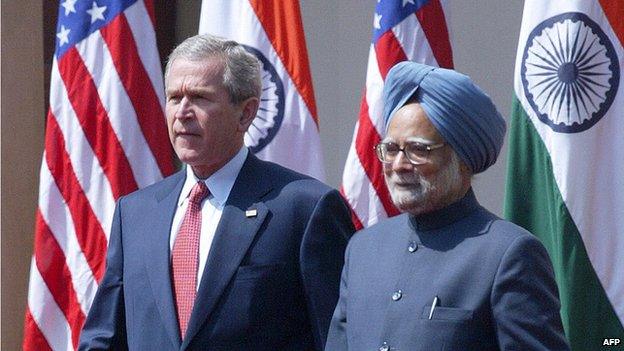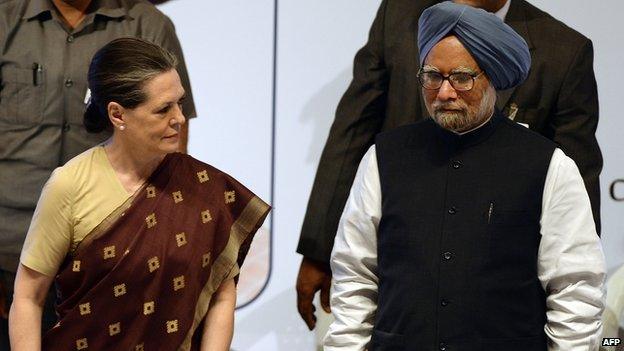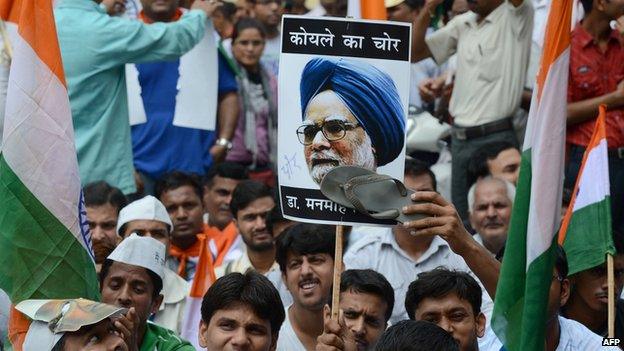Profile: Manmohan Singh
- Published

Manmohan Singh is still viewed as perhaps the cleanest politician in India
Former prime minister Manmohan Singh is widely regarded as the architect of India's economic reforms programme.
He was one of India's longest serving prime ministers and earned a reputation as a man of great personal integrity.
But Mr Singh's second term in office was marred by a string of corruption scandals that came to dog his administration.
The scandals, say many, were partially responsible for his Congress party's crushing defeat in the 2014 general election.
Mr Singh, 82, was the first Sikh to hold the country's top post and made a public apology in parliament for the 1984 riots in which some 3,000 Sikhs were killed.
He was first appointed in 2004 after Congress president Sonia Gandhi turned down the post, apparently to protect the party from damaging attacks over her Italian origin.
Then when Mr Singh guided Congress to a second, decisive election victory in 2009, he vowed that the party would "rise to the occasion".
But the gloss soon began to wear off and his second term was in the news mostly for all the wrong reasons - several , external involving his cabinet ministers which allegedly cost the country billions of dollars, a parliament stalled by the opposition, and a huge policy paralysis that resulted in a serious economic downturn.
LK Advani, a senior BJP leader, called Mr Singh India's "weakest prime minister".
Mr Singh defended his record, saying his government had worked with "utmost commitment and dedication for the country and the welfare of its people".
'Accidental PM'
A studious former academic and bureaucrat, he is known for being self-effacing and has always kept a low profile. His Twitter debut, external was noticed mostly for its dull entries and had a limited number of followers.

The biggest triumph during Mr Singh's first five-year term was to bring India out of nuclear isolation by signing a landmark deal with the US
A man of few words, his calm demeanour, however, won him many admirers.
Responding to questions on a coal scandal involving the illegal allocation of licences worth billions of dollars, he defended his silence on the issue by saying it was "better than thousands of answers".
In March he was summoned to appear in court in April to answer allegations of criminal conspiracy, breach of trust and corruption related offences.
An upset Mr Singh told reporters that he was "open for legal scrutiny" and that the "truth will prevail".
Critics say there was never any doubt that Sonia Gandhi was the real power centre while he was prime minister he was never fully in charge.
The biggest triumph during his first five-year term was to bring India out of nuclear isolation by signing a landmark deal giving India access to American nuclear technology.
But the deal came at a price - the government's Communist allies withdrew support after protesting against it, and Congress had to make up the lost numbers by enlisting the support of another party amid charges of vote buying.
Consensus builder
Mr Singh rose to political prominence as India's finance minister in 1991, taking over as the country was plunging into bankruptcy.

Critics say there was never any doubt that Sonia Gandhi was the real power
In his maiden speech he famously quoted Victor Hugo, saying that "no power on earth can stop an idea whose time has come".
That served as the launch for an ambitious and unprecedented economic reform programme.
The economy revived, industry picked up, inflation was checked and growth rates remained consistently high in the 1990s.
His unexpected appointment as finance minister capped a long and illustrious career as an academic and civil servant.
After attending Panjab University he took a master's degree at Cambridge University and a DPhil at Oxford.
But Manmohan Singh was a man acutely aware of his lack of political mass base. "It is nice to be a statesman, but in order to be a statesman in a democracy you first have to win elections," he once said.

Mr Singh's opponents have accused him of involvement in coal scandal
He never personally won a mass, popular vote, although he may claim the 2009 election served as such. Rather, other leaders selected him.
When he tried to be elected to India's lower house, in 1999, he was defeated. He sits instead in the upper house, chosen by his own Congress party.
A consensus builder, Mr Singh presided over a coalition of sometimes difficult, assertive and potentially unruly regional coalition allies and supporters.
And though he has earned respect for his integrity and intelligence, he also has a reputation for being soft and indecisive.
Some critics claimed that the pace of reform slowed and he failed to achieve the same momentum he had while finance minister.
China border
In his foreign policy, Mr Singh adopted the pragmatic politics pursued by his two predecessors.
He continued the peace process with Pakistan - though this process was hampered by attacks blamed on Pakistani militants, culminating in the Mumbai gun and bomb attack of November 2008.
He tried to end the border dispute with China, brokering a deal to reopen the Nathu La pass into Tibet which had been closed for more than 40 years.
Mr Singh increased financial support for Afghanistan and became the first Indian leader to visit the country for nearly 30 years.
He also angered many opposition politicians by appearing to end relationships with India's old ally, Iran.
History will remember him for bringing India out of economic and nuclear isolation, although some historians may suggest he should have retired earlier.